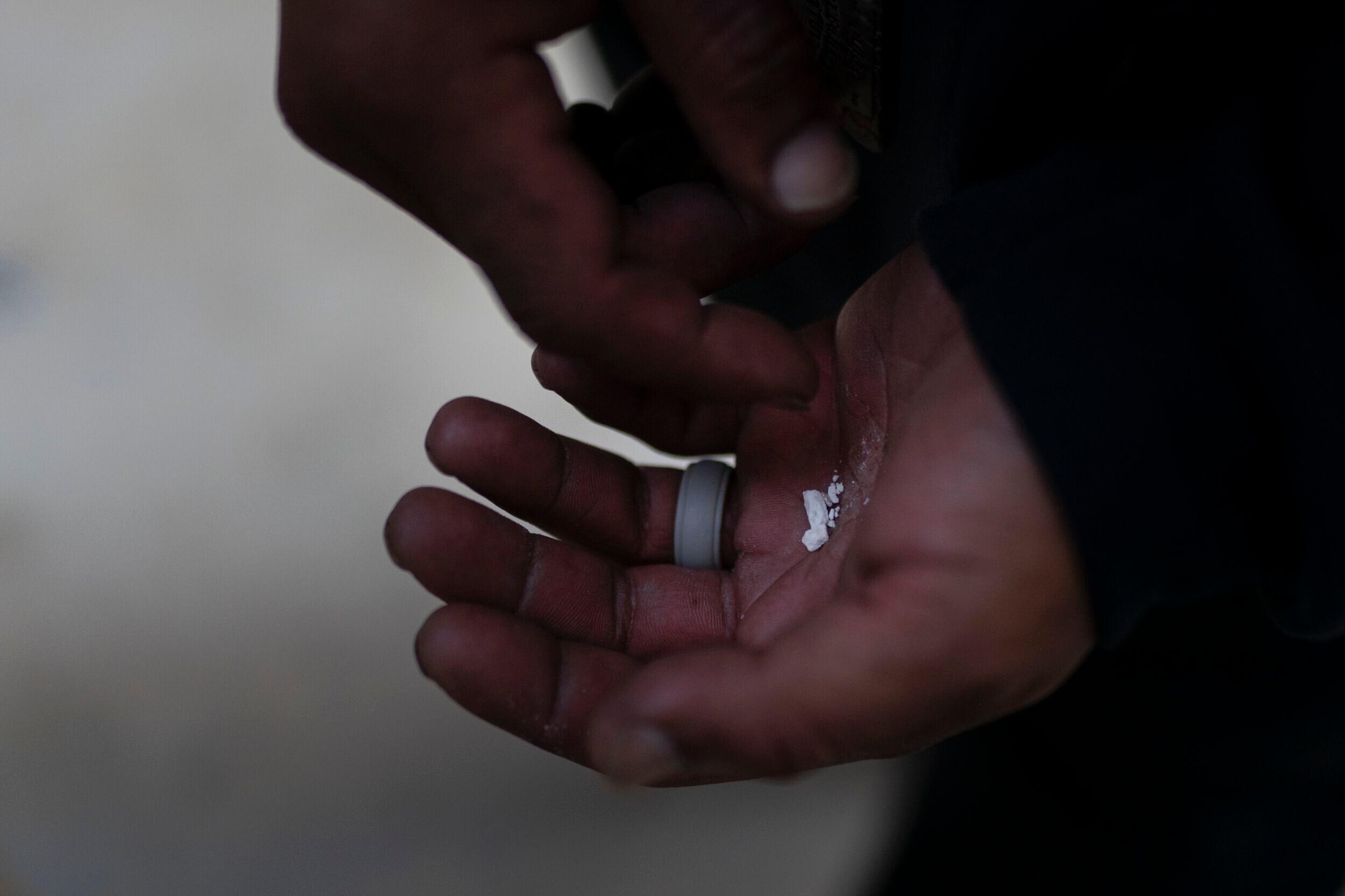"And since it's odorless and tasteless, it can be mixed with anything, and you would never know. The cartels making the drugs and dealers mixing and selling don't care about precisely measuring portions when they are mixing drugs, and they don't care who dies."
How does the drug operate?
Fentanyl works by binding to the body's opioid receptors—found in the areas of the brain that control pain and emotions, according to the National Institute on Drug Abuse. Some of the effects of fentanyl include euphoria, relaxation, pain relief, drowsiness and sedation, among others, according to the U.S. Drug Enforcement Administration. With repeated use, the brain adapts to the drug, making it hard to feel pleasure without it. Stopping the use of fentanyl leads to withdrawal, or “dope sickness,” which can include extreme anxiety, vomiting, muscle pain, chills, racing heartbeat and profuse sweating. Many chronic users have long since stopped feeling the euphoric effects of fentanyl and use it to avoid feeling sick."
Opium is an ancient drug. It was birthed from the poppy plant.
Now, it's twisted and used synthetically to anesthetize too many in our culture.
But here's the real question.
How did this happen?
And why?
Why are men, according to the National Center for Drug Abuse Statistics, ages 22-45 overdosing at alarming rates?
Why have "Fentanyl OD rates increased 1,105% from 2012 to 2018?
And why, according to Pew Research, have women's OD rates increased too?
Some answers include that the drug is cheap to make. And that it's easy to find or doesn't take much to get high. Or that it's laced with other substances, many times without the user's knowledge, lately with deadly results.
But isn't there more to it than that?
Aren't there root causes worth examining?
Starting first with the way we view pain?
Pain, as my physician husband explained, was considered to be the fifth vital sign. As young doctors, they were taught to treat the pain away.
They did and patients got hooked.
The good news? Doctors changed their attitudes and behavior toward pain.
Now, they prescribe strong drugs for only days at a time.
If they changed, we can too.
Still, for a time, here's how pain, as the fifth vital sign, played out.
It happened in our kid's doctor's office.
Remember the pain chart slapped haphazardly on the back of their door? Remember when your child didn't have the words, but they could understand both frowning and smiley faces? And they were instructed to point to the face on that chart that corresponded with their pain level?
No matter what we did, we didn't want them to hurt. At all.
And who would? They're babies and little kids, for crying out loud.
But, over time, did our desire to keep them from ever feeling pain send a subtle message? That pain is the enemy, and we should avoid it?
But there's another root cause.
What about our societal desire to keep kids from feeling bad?
And not just in regards to physical pain. But emotional pain, too.
This was demonstrated most clearly in sports.
Remember years ago, when we took away the score, any sense of healthy competition, and an honestly earned reward? The thinking at the time was that it would help kids learn to play their sport without pressure.
But did we stop to consider what would happen when we did?
Did we unwittingly take vital life lessons away by removing both the glory of victory and the pain and lessons learned in defeat? Did we quell the natural desire to achieve? And to succeed?
But we didn't stop there, did we?
Look at high schools and colleges, where this still plays out.
Many schools across the country removed the designation of Valedictorian or Salutatorian because equity became more important than anything else.
Consider high-level universities that won't let anyone graduate with honors.
What in the ever-loving world is that supposed to accomplish?
Reward non-achievement? By dragging down those who did?
Is this Fentanyl crisis, with skyrocketing rates of abuse and overdose deaths, partly a symptom of what happens when we hide reality from our kids and young adults? When we substituted comfort for failure? Or, pretended that being the same was better than standing out?
What did we think would happen when we blew down all their problems and removed any of their pain? When we didn't let them learn from their mistakes? Or, teach them to suffer well? Because suffering, though none would choose it, is quite the teacher.
But, how did we think they'd cope when there were no fake safeguards?
What did we think would happen when we finally divorced God and the meaning He imparts to all of life? Did we expect anything less than despair?
And, lest I ignore the elephant in the room.
Yes, we can and should address the border crisis.
We can and should address drugs and smugglers that pass through the border, like water through burst pipes.
We can and should get serious about enforcing the laws already on the books.
We could add to them, like Alabama legislators say they'll do, during our upcoming legislative session.
We can; we should do all of those things.
And while we experiment with reversal agents, and screenings for contaminated drugs, while we educate the public and warn the young, while we do all of that, we'd be remiss if we fail to address the heart.
That's the place where we should begin.
Amie Beth Shaver is a speaker, writer and media commentator. Her column appears every Wednesday in 1819 News. Shaver served on the Alabama GOP State Executive Committee, was a candidate for State House District 43 and spokeswoman for Allied Women.
The views and opinions expressed here are those of the author and do not necessarily reflect the policy or position of 1819 News. To comment, please send an email with your name and contact information to Commentary@1819News.com.










